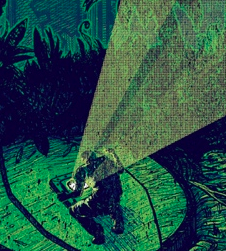Bonie sits perched atop a rocky knoll overlooking the whole of Dagger’s Deep. It is early morn, and the settlement is blanketed in a misty fog that portends rain. The thick air reminisces of the night the friends watched two forlorn travelers searching amid the darkness for something they would not find.
Or had they?
As if to underscore the likeness, the woman’s keen eyes are affixed to the very spot where Wyardt stood, grasping out and calling to her by name. The detail isn’t lost on Zeb as he approaches, though Bonie’s countenance speaks not of sadness nor longing, but of deep reflection and thought.
She doesn’t turn to regard him, but Zeb knows that her awareness is piqued. From Bonie, Zeb can conceal nothing, though to Zeb, the woman can seem impenetrable, as is the case at this moment, her hair tied dutifully back, wearing her customary dark leathers. Her deadly bow rests idly at her side.
“Did you know,” she begins, still without looking up, “that when West Tower was founded, goblin clans had to be purged from the surrounding hills by the Axe of Mirabar? The location was of strategic import to establishing a land route through the Khedrun Valley and accessing its villages. But the goblins that dwelt there were mighty in force: after a great battle was fought at the foot of Rolling Death Falls, a contingent of soldiers pursued the goblin chieftain for many miles upriver, all the way into the lower peaks of the Spine of the World.”
She runs a hand across her hair, above her left ear; Zeb watches with intent. “I know all this from Falinor Daggercross, for I was, after all, stationed in West Tower to observe his dealings, in secret, under the employ of the Abbé Lira. It feels a lifetime ago, so much that I only now have come to remember this recounting...
“When finally the Axe confronted the goblin chieftain and his remaining minions, a bloodbath raged o’er a mountain pass marked by a great boulder which bore twin sunken recesses, like the hollow eyes of an unworldly skull. Upon the chieftain’s slaying and the soldiers’ victory, the site was christened... Death’s Head Pass. That was forty years ago, more or less. Forty years ago, that is, from our time... sixty years from now.”
Finally, Bonie raises eyes to her counterpart, meeting his gaze. “The place has not yet been named, Zeb, though the name is scribed as clearly as the running waters of the River Mirar on the parchment we found sealed in an underground chamber, where it had lain dormant for years, if not decades. What does it mean?”
Or had they?
As if to underscore the likeness, the woman’s keen eyes are affixed to the very spot where Wyardt stood, grasping out and calling to her by name. The detail isn’t lost on Zeb as he approaches, though Bonie’s countenance speaks not of sadness nor longing, but of deep reflection and thought.
She doesn’t turn to regard him, but Zeb knows that her awareness is piqued. From Bonie, Zeb can conceal nothing, though to Zeb, the woman can seem impenetrable, as is the case at this moment, her hair tied dutifully back, wearing her customary dark leathers. Her deadly bow rests idly at her side.
“Did you know,” she begins, still without looking up, “that when West Tower was founded, goblin clans had to be purged from the surrounding hills by the Axe of Mirabar? The location was of strategic import to establishing a land route through the Khedrun Valley and accessing its villages. But the goblins that dwelt there were mighty in force: after a great battle was fought at the foot of Rolling Death Falls, a contingent of soldiers pursued the goblin chieftain for many miles upriver, all the way into the lower peaks of the Spine of the World.”
She runs a hand across her hair, above her left ear; Zeb watches with intent. “I know all this from Falinor Daggercross, for I was, after all, stationed in West Tower to observe his dealings, in secret, under the employ of the Abbé Lira. It feels a lifetime ago, so much that I only now have come to remember this recounting...
“When finally the Axe confronted the goblin chieftain and his remaining minions, a bloodbath raged o’er a mountain pass marked by a great boulder which bore twin sunken recesses, like the hollow eyes of an unworldly skull. Upon the chieftain’s slaying and the soldiers’ victory, the site was christened... Death’s Head Pass. That was forty years ago, more or less. Forty years ago, that is, from our time... sixty years from now.”
Finally, Bonie raises eyes to her counterpart, meeting his gaze. “The place has not yet been named, Zeb, though the name is scribed as clearly as the running waters of the River Mirar on the parchment we found sealed in an underground chamber, where it had lain dormant for years, if not decades. What does it mean?”






















